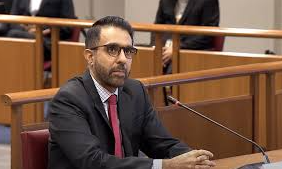A look into the opposition leader’s handling of the affair scandal and the tactics of political survival.
SINGAPORE – Leader of the Opposition and Secretary-General of the Workers’ Party, Mr Pritam Singh, addressed the resignation of two prominent party members, Mr Leon Perera and Ms Nicole Seah, who admitted to having an affair. During a press conference on July 19, Mr Singh was asked about the party’s investigation into the allegations, which surfaced between late 2020 and 2021. The affair was only confirmed when a grainy video emerged in mid-July showing Mr Perera and Ms Seah in an intimate moment.
Initially, Mr Singh had been informed of the affair by Mr Perera’s personal driver, who raised concerns about the couple’s frequent meetings. Despite being questioned, both Perera and Seah denied the affair, claiming that the allegations were untrue. The lack of corroborating evidence at the time led Mr Singh to take a cautious approach, refraining from launching a full investigation.
However, the video footage that surfaced online forced Mr Singh to address the matter publicly. His handling of the situation raised questions about the thoroughness of the party’s internal investigation and its transparency. While some argue that the affair was serious enough to warrant an independent inquiry, Mr Singh found himself in a difficult position. Conducting an investigation could have led to political fallout, regardless of the outcome. If the allegations were proven false, it could have raised doubts about Mr Singh’s trust in his colleagues. On the other hand, confirming the affair would have required a public confession, potentially causing severe damage to the Workers’ Party’s image.
To Open a Can of Worms
The political dilemma faced by Mr Singh illustrates the tension between transparency and political survival. When confronted with the allegations, Mr Singh’s response was measured, opting not to launch an immediate investigation. This decision, while criticized by some, minimized immediate damage. An independent investigation could have opened a Pandora’s box, leading to uncomfortable revelations and deeper scrutiny from the media. As Mr Singh recognized, some situations offer no ideal answers; instead, politicians often rely on damage control strategies.
If the allegations had been true, Mr Singh would have had to navigate the difficult choice of how and when to disclose the information. The political cost of revealing the truth prematurely could have been enormous, with potentially catastrophic effects on the Workers’ Party’s public perception.
Hindsight’s 20/20
In the end, Mr Singh’s decision to “act blur” in this situation, relying on plausible deniability, proved to be a politically pragmatic move. While he did not fully investigate the allegations at the time, he eventually took responsibility for the situation once the video footage surfaced. By doing so, he managed to limit the fallout, avoiding the more catastrophic consequences that would have resulted from either denying or dismissing the issue entirely.
The phrase “act blur, live longer” may seem like a simplistic strategy, but in politics, it often serves as a survival mechanism. When faced with sensitive issues, politicians must sometimes choose to downplay or delay action until they can better assess the consequences. While Mr Singh’s approach may not have been ideal, it was the best course of action given the circumstances.
A Tale of Two Affairs
In a curious turn of events, the Workers’ Party affair coincided with another scandal involving former Speaker of Parliament Tan Chuan Jin and former Tampines GRC MP Cheng Li Hui, who also resigned after admitting to an extramarital affair. In both cases, the timing of the revelations and the manner in which they were handled raised questions about transparency and accountability within Singapore’s political landscape.
While PM Lee Hsien Loong’s handling of Mr Tan’s resignation differed from Mr Singh’s approach, both leaders faced public scrutiny and had to navigate the difficult balance between personal issues and public office. In both cases, the public’s demand for transparency revealed the challenges faced by political leaders in maintaining public trust, especially when personal matters become intertwined with their professional lives.
Conclusion
In the end, the handling of both affairs demonstrates the complexity of balancing personal integrity with political survival. Politicians, like all individuals, are human, and they must navigate the difficult terrain of personal conduct, public expectations, and political realities. While the responses to the affairs may have varied, the outcome was clear: political actions will always be scrutinized, and transparency, though difficult, is essential for maintaining public trust.








